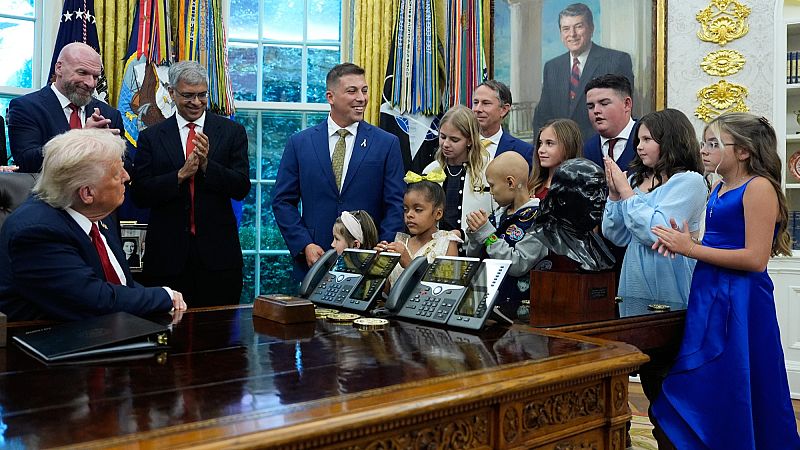Donald Trump signs executive order to use AI in fight against childhood cancer

President Donald Trump has announced a new executive order aimed at using artificial intelligence (AI) to increase progress in the fight against pediatric cancer.
The order pledges $50 million(€43 million) in new funding to a childhood cancer data initiative, first launched during Trump’s initial term in office. Officials say the funding will help gather and analyse vast amounts of medical data, to use AI to improve diagnoses, speed up clinical trials and sharpen prevention efforts.
"We're going to hook up the artificial intelligence with all of the other things that we have at hand," Trump said in the Oval Office on Tuesday. “And we're going (to) come for answers and these young children who are just really, some are absolutely better and others are getting better".
Turning to the young cancer survivors gathered around the Resolute desk, Trump added: “You’re all going to be better very soon”.
White House officials declined to specify which companies or technologies might take part, saying the details are still in development. But Trump suggested the technology would eventually be widely available: “It’s gonna be so accessible to everybody”.
Pediatric cancer: rare but devastating
Although relatively rare, cancer is the leading cause of disease-related death after infancy among children in the United States. The American Cancer Society estimates that about 9,550 children in the US will be diagnosed with cancer in 2025.
While survival rates have improved dramatically - with childhood cancer mortality falling by more than 50 per cent since 1975 - incidence rates have steadily increased since the 1970s.
Globally, cancer affects around 400,000 children and adolescents under 19 each year, according to the World Health Organization (WHO).
Pediatric cancer research also remains chronically underfunded, representing less than 10 per cent of the federal cancer research budget, according to the Children’s Cancer Foundation.
Trump's executive order doubles the National Institutes of Health’s commitment to the Childhood Cancer Data Initiative, bringing total funding to $100 million. But it comes against a backdrop of broader cuts to federal science funding under his administration.
In recent years, hundreds of scientists have been removed from the federal payroll and several hundred million dollars in grants - including some supporting pediatric cancer studies - have been cancelled.
The Pediatric Brain Tumor Consortium, a national network that has given children access to experimental treatments for more than 25 years, was told in August it would no longer receive federal support. Earlier budget drafts also proposed slashing the National Cancer Institute’s funding by more than a third, but those cuts still remain under negotiation.
The American Cancer Society Cancer Action Network has warned that the proposed cuts “will set this nation back dramatically in our ability to reduce death and suffering".
Today

